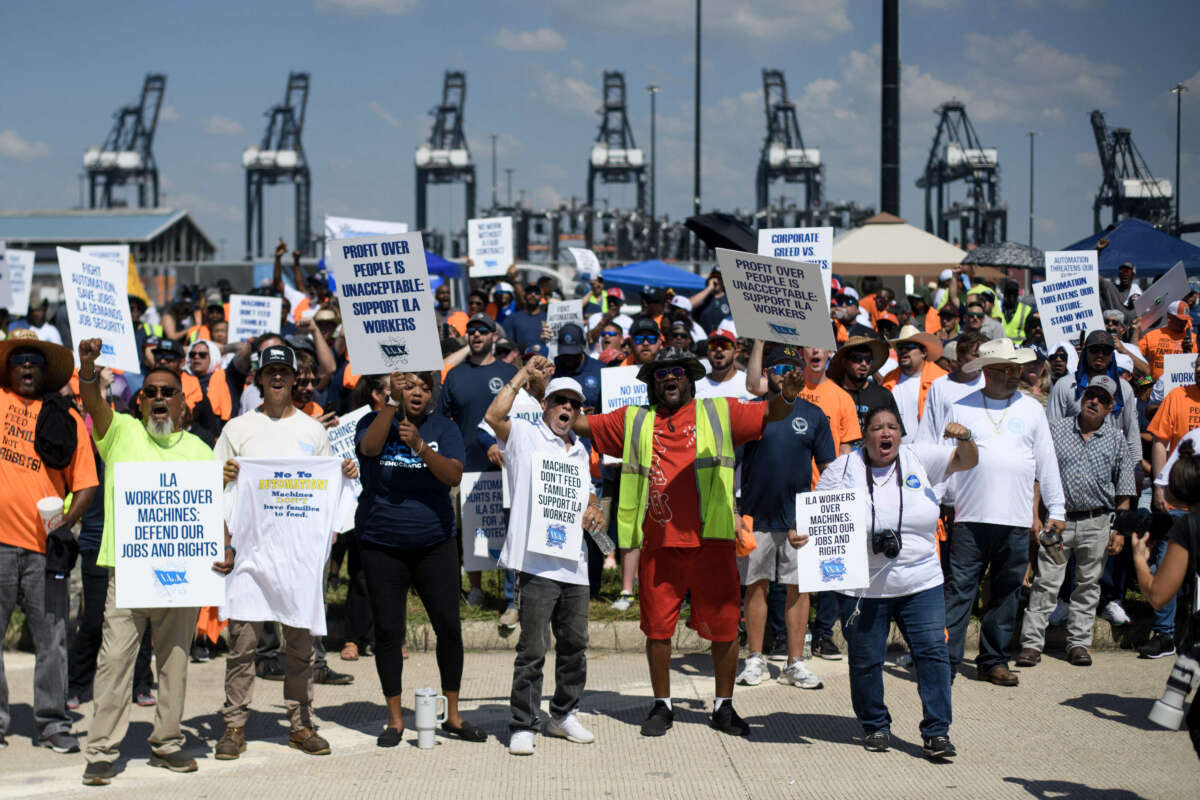Support justice-driven, accurate and transparent news — make a quick donation to Truthout today!
The union representing East and Gulf Coast dockworkers suspended its strike on Thursday after reaching a tentative agreement with shipping giants that reportedly includes a 62% wage boost over six years.
The International Longshoremen’s Association (ILA) said in a joint statement with the United States Maritime Alliance (USMX) that the union would suspend its strike until January 15 so the two sides can “return to the bargaining table to negotiate all other outstanding issues.”
“Effective immediately, all current job actions will cease and all work covered by the Master Contract will resume,” the statement added.
The tentative deal followed three days on the picket line during which dockworkers — who are essential to the functioning of the U.S. economy — cast their fight as a critical struggle against multinational corporations that raked in huge profits during the Covid-19 pandemic and enriched their investors as wages failed to keep pace with inflation.
“These companies… they don’t give a fuck about us,” Harold Daggett, the ILA’s president, said from a picket line in New Jersey earlier this week. “Well, we’re gonna show them they’re gonna have to give a fuck about us. Because nothing’s gonna move without us.”
According to one estimate, the dozens of ports affected by the strike handle a combined 25% of the United States’ international trade.
The Associated Press reported Thursday that the two sides reached a tentative deal after “the ports sweetened their wage offer from about 50% over six years to 62%.”
The union originally sought a 77% raise, but in recent days Daggett said the ILA would pursue a 61.5% raise for workers over the course of a new contract. Daggett rejected the shipping industry’s previous wage offers as “insulting.”
Under the contract that expired earlier this week, starting pay for dockworkers was $20 an hour.
Any final agreement must be ratified by union members, who also demanded protections from automation and other benefit improvements. Reuters reported that automation is among the “key issues that remain unresolved.”
“When we STRIKE, we WIN!” the AFL-CIO, the nation’s largest federation of unions, wrote on social media late Thursday. “Congratulations to ILA members for making huge strides and thank you to the millions of union members who stood in solidarity with them.”
U.S. Sen. Bernie Sanders (I-Vt.) also congratulated “the 50,000 port workers who went on strike against the outrageous corporate greed of the shipping industry and won a historic increase in wages.”
“Billionaires in the shipping industry must not be allowed to get even richer by replacing port workers with robots,” the senator wrote.
Sanders added that Acting Labor Secretary Julie Su “did a great job negotiating a tentative agreement to increase the wages of port workers by 62% over six years.”
The Biden administration declined to intervene on the side of industry to halt the strike, and President Joe Biden issued a statement earlier this week noting that “ocean carriers have made record profits since the pandemic and in some cases profits grew in excess of 800% compared to their profits prior to the pandemic.”
“Executive compensation has grown in line with those profits and profits have been returned to shareholders at record rates,” said Biden. “It’s only fair that workers, who put themselves at risk during the pandemic to keep ports open, see a meaningful increase in their wages as well.”
In a statement following news of the tentative deal, Biden said that “today’s tentative agreement on a record wage and an extension of the collective bargaining process represents critical progress towards a strong contract.”
“I congratulate the dockworkers from the ILA, who deserve a strong contract after sacrificing so much to keep our ports open during the pandemic,” the president said. “And I applaud the port operators and carriers who are members of the U.S. Maritime Alliance for working hard and putting a strong offer on the table.”
A terrifying moment. We appeal for your support.
In the last weeks, we have witnessed an authoritarian assault on communities in Minnesota and across the nation.
The need for truthful, grassroots reporting is urgent at this cataclysmic historical moment. Yet, Trump-aligned billionaires and other allies have taken over many legacy media outlets — the culmination of a decades-long campaign to place control of the narrative into the hands of the political right.
We refuse to let Trump’s blatant propaganda machine go unchecked. Untethered to corporate ownership or advertisers, Truthout remains fearless in our reporting and our determination to use journalism as a tool for justice.
But we need your help just to fund our basic expenses. Over 80 percent of Truthout’s funding comes from small individual donations from our community of readers, and over a third of our total budget is supported by recurring monthly donors.
Truthout has launched a fundraiser to add 310 new monthly donors in the next 4 days. Whether you can make a small monthly donation or a larger one-time gift, Truthout only works with your support.
